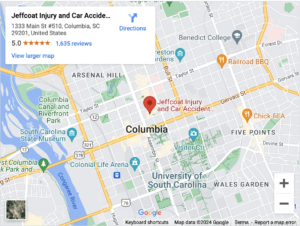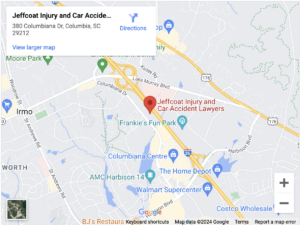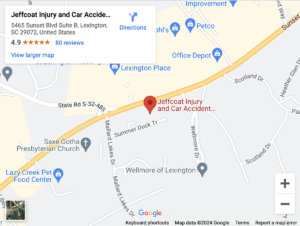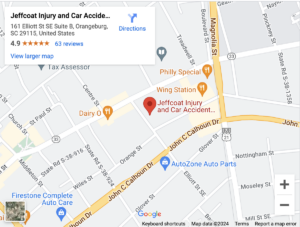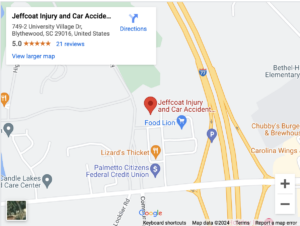October 27, 2025 | Truck Accidents

Your Medical Records Are Key Evidence After a Semi-Truck Crash
After a devastating collision with an 18-wheeler, you’re facing mounting medical bills, painful injuries, and uncertainty about your future. One of the most powerful tools your attorney has to fight for fair compensation is your medical documentation. These records tell the story of your injuries, connect them directly to the crash, and prove why you deserve every dollar of compensation you’re seeking. Understanding what medical records can be obtained and how they’ll be used in your case helps you feel more in control during an overwhelming time.
💡 Pro Tip: Start keeping a daily journal documenting your pain levels, emotional distress, and how your injuries affect your daily activities – these personal logs can serve as valuable evidence alongside your medical records.
Take the first step towards recovery with Jeffcoat Injury and Car Accident Lawyers, where your medical records become the cornerstone of your claim. If you’ve been in a semi-truck accident, let’s transform those documents into a powerful case for the compensation you deserve. Give us a ring at (803) 200-2000 or contact us online today!
Your Rights to Medical Documentation Under South Carolina Law
South Carolina law gives your semi-truck accident lawyer powerful tools to obtain comprehensive medical documentation for your case. The South Carolina Physicians’ Patient Records Act establishes clear guidelines for accessing medical records, requiring physicians to retain records for at least ten years for adult patients and thirteen years for minors. This means even if your crash aggravated a pre-existing condition from years ago, those records should still be available to help prove how the collision worsened your health.
Through the legal discovery process, your South Carolina semi-truck accident lawyer can request various types of medical evidence including emergency room assessments, follow-up appointments with your primary care physician, consultations with specialists, diagnostic imaging results, and all associated medical bills. These documents verify the severity of your injuries and establish that direct link between the accident and your symptoms that insurance companies often try to dispute.
💡 Pro Tip: Sign medical release forms promptly when your attorney requests them – physicians who release records in good faith based on your written authorization are immune from liability under South Carolina law, so there’s no risk in authorizing these releases.
The Discovery Timeline for Obtaining Medical Evidence
Getting your medical records into evidence follows a specific legal process with important deadlines. Your South Carolina semi-truck accident lawyer will use several discovery methods to build your case, and understanding this timeline helps set realistic expectations for your claim’s progress.
- Document requests sent to healthcare providers must allow reasonable time for response – physicians can charge search and duplication fees adjusted annually based on the Consumer Price Index
- Interrogatories (written questions) to the trucking company may reveal their insurance coverage limits and previous safety violations, helping establish patterns of negligence
- Depositions of your treating physicians can provide powerful testimony about the extent of your injuries and future medical needs
- Subpoenas under Rule 45 can command production of electronic medical records in specific formats, ensuring nothing gets lost in translation
- The trucking company’s discovery requests must be answered within 30 days, creating momentum in your case
💡 Pro Tip: South Carolina’s electronic discovery rules mirror federal procedures, making the process efficient and cost-effective – your attorney can request records in searchable formats that make it easier to highlight key medical findings.
How a South Carolina Semi-Truck Accident Lawyer Uses Medical Records to Build Your Case
Your medical documentation becomes the foundation of proving damages in your semi-truck injury claim. Jeffcoat Injury and Car Accident Lawyers understands how to transform medical records into compelling evidence that insurance companies and juries can’t ignore. Emergency room records capture those critical first hours after impact, documenting immediate injuries that might otherwise be minimized by defense attorneys months later. Follow-up appointments show your commitment to recovery while specialist consultations reveal the true long-term impact of your injuries.
Beyond just gathering records, an experienced South Carolina semi-truck accident lawyer knows how to present this evidence effectively. Medical bills aren’t just numbers – they represent real financial hardship caused by someone else’s negligence. Diagnostic imaging tells a visual story that words alone can’t convey. When combined with witness statements that corroborate your account of the collision, these medical documents create an undeniable narrative of harm that demands fair compensation.
💡 Pro Tip: Request copies of all medical records for yourself as treatment progresses – having your own complete set ensures nothing gets overlooked and helps you stay informed about your own care.
Special Considerations for Commercial Vehicle Crash Documentation
Semi-truck accidents involve unique medical documentation challenges that don’t exist in regular car crashes. The Large Truck and Bus Crash Statistics from FMCSA show that large trucks (vehicles with gross vehicle weight ratings over 10,000 pounds) create catastrophic injuries requiring extensive medical documentation. Your medical records must capture not just immediate trauma but also the amplified forces involved when an 80,000-pound vehicle strikes a passenger car.
Federal Database Requirements Impact Your Medical Evidence
The FMCSA maintains multiple databases tracking commercial vehicle crashes, and your South Carolina semi-truck accident lawyer can use this federal data to strengthen your medical evidence. When a crash results in injuries requiring immediate medical attention away from the scene, it becomes a SAFETYNET reportable incident. This federal tracking creates additional documentation opportunities – your medical records can be cross-referenced with national safety data showing patterns of severe injuries in similar crashes. Understanding that crash data remains preliminary for 22 months means your attorney might discover additional supporting evidence as federal investigations progress.
💡 Pro Tip: Ask your attorney about obtaining the trucking company’s safety profile through FMCSA databases – previous violations can demonstrate a pattern of dangerous behavior that strengthens your injury claim.
Protecting Your Medical Privacy While Building Your Case
South Carolina law provides strong protections for your medical privacy even as records are shared during litigation. Physicians may refuse to release portions of records if they reasonably believe disclosure could harm your emotional or physical well-being, though unreasonable refusal constitutes unprofessional conduct subject to disciplinary action by the South Carolina State Board of Medical Examiners. Your semi-truck injury lawyer in South Carolina understands these nuances and can advocate for appropriate disclosure that protects your privacy while still obtaining necessary evidence.
Strategic Medical Record Disclosure in Multi-Million Dollar Cases
Semi-truck injury cases often involve substantial damages, making strategic disclosure of medical records crucial. Your South Carolina semi-truck injury attorney can work with treating physicians to provide summaries when complete records might include irrelevant personal information. The key is ensuring all crash-related injuries are thoroughly documented while maintaining appropriate boundaries around unrelated medical history. This balanced approach protects your dignity while building the strongest possible case for compensation.
💡 Pro Tip: Discuss any sensitive medical history with your attorney upfront – they can often limit discovery requests to relevant time periods and conditions, preventing unnecessary disclosure of private information.
Frequently Asked Questions
Common Concerns About Medical Records in Truck Accident Cases
Many clients worry about privacy, costs, and timelines when their South Carolina semi-truck injury lawsuit requires extensive medical documentation. Understanding the process helps reduce anxiety and ensures you’re prepared to support your attorney’s efforts.
💡 Pro Tip: Keep a folder with copies of all medical bills, appointment summaries, and prescription receipts – organizing these documents as you receive them saves time and strengthens your case.
Understanding the Legal Process for Medical Evidence
The discovery process might seem overwhelming, but your South Carolina semi-truck injury attorney handles the complex legal procedures while keeping you informed of important developments. Knowing what to expect helps you feel more in control of your case.
💡 Pro Tip: Create a medical treatment calendar showing all appointments, procedures, and therapy sessions – this visual timeline helps your attorney quickly understand your recovery journey.
1. Can the trucking company’s insurance demand all my medical records from before the accident?
While they may request extensive records, your South Carolina semi-truck accident lawyer can object to overly broad requests. Generally, only records relevant to claimed injuries or pre-existing conditions affecting those injuries are discoverable. Your attorney will fight to protect your privacy while complying with legitimate discovery obligations.
2. What happens if my doctor’s office says my old medical records were destroyed?
South Carolina law requires physicians to maintain records for at least 10 years for adults. If records were sold when a practice closed, public notice requirements mean they should still be traceable. Your semi-truck injury lawyer in South Carolina can investigate alternative sources like insurance records or hospital databases to reconstruct missing documentation.
3. How long do I have to provide medical records after receiving a discovery request?
South Carolina discovery rules typically allow 30 days to respond to document requests. Your South Carolina trucking company liability attorney will handle these deadlines, but promptly signing medical authorizations helps ensure timely compliance and keeps your case moving forward.
4. Will my mental health records be included if I’m claiming emotional distress?
Claiming emotional distress may open some mental health records to discovery, but disclosure is limited to relevant treatment. Your semi-truck medical records discovery process includes protections – your attorney can seek protective orders limiting access to particularly sensitive information while still proving your emotional injury claims.
5. What medical evidence is most important for proving future medical needs?
Specialist opinions, diagnostic test results showing permanent injury, and treatment plans outlining future surgeries or therapies carry the most weight. Your South Carolina commercial vehicle accident attorney will work with medical experts to document not just current conditions but anticipated lifetime medical needs resulting from your injuries.
Work with a Trusted Semi-Truck Injury Lawyer
Securing comprehensive medical documentation requires legal knowledge, strategic thinking, and relentless advocacy. The semi-truck injury legal discovery South Carolina process involves federal regulations, state laws, and complex medical evidence that demands experienced representation. When catastrophic injuries disrupt your life, you need attorneys who understand both the legal system and the medical evidence necessary to prove your damages. Building a strong case starts with obtaining the right medical records and knowing how to use them effectively in negotiations or at trial.
Ready to turn your medical records into a winning strategy? At Jeffcoat Injury and Car Accident Lawyers, we’re committed to navigating the complexities of semi-truck accident claims to secure the compensation you deserve. Reach out at (803) 200-2000 or contact us today and let’s get started on your road to recovery.


